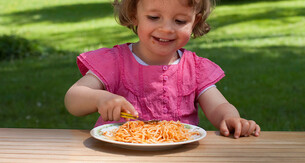What are good eating habits?
Good eating habits for kids are essential for their overall well-being and health. There are a few guidelines that will help with healthy eating habits for your little ones:
1. Hydration : Hydrating your body helps to regulate body temperature as well as supporting the overall digestion and nutrient absorption. Hence it’s important to:
- Limit sugary drinks like sweetened beverages and carbonated drinks. Sweetened beverages usually have a very high amount of sugar in the overall content. Hence, it is advisable to refrain from them as it will cause addiction and disrupts the digestion and absorption.
- Take sufficient water intake every day. Drinking enough water will increase bodily functions and remove waste products easily for children.
2. Balanced diet : A balanced diet is crucial for good health as it maintains the body with adequate nutrients, supports organs functionality, and improve energy level. A variety of food from all food groups is encourage, such as grains, proteins, vegetables, fruits and dairy products.
- Grains is a good energy source from the carbohydrate component that it has.
- Proteins : It supports the growth and development from the building blocks as known as amino acids, which is necessary for the formation and reparation of tissues, muscles and bones throughout the body.
- Vegetables / Fruits : Take lots of leafy vegetables and fruits with lots of fibre content which will improve digestion overall.
- Dairy products : Milk and cheese are high in calcium which will promote healthy bones for kids.
3. Portion control : It is important to control the portion of food to avoid over-eating or eating too little. It is easier to encourage a balance of nutrient intake. Some ways to encourage portion control is to allow children to recognize how to eat in moderation or know when they are full.
4. Regular Meals : Having regular meals improves the digestive health as it will stimulate the secretion of digestive enzyme and promote regular bowel movement. Schedule regular meal times to set a routine for them and promote balanced meal throughout the process.
How can parents teach their children healthy eating habits?
1. Start Early
Start introducing children to different kinds of healthy food and allow them to develop their taste preferences. This will also prevent kids from being picky with their food especially for vegetables and fruits.
2. Education about Nutrition
It is normal for children to be picky, hence it is important to teach children about the nutritional value of different foods and the importance of having a balanced diet.
3. Be a Role Model
Demonstrate healthy eating habits by making wise food choices and maintaining a good attitude towards food. Most of the time, children imitate their parent’s behaviour and choices.
4. Set a Routine
Setting a routine for meal time helps regulate hunger cues and prevent them from excessive snacking.
5. Limit Processed Foods
Keep healthy food more accessible at home than processed food. This will help children to subconsciously choose healthier options than opting for sugary or unhealthy food.
The best eating habits for kids
Food choices
1. Whole Grains: Choose whole grains instead of refined grains such as brown rice and whole wheat which provides essential fibre and nutrients.
2. Protein: Protein is important for growth and muscle development, hence include a variety such as eggs, lean meat and dairy products.
3. Fruits and Vegetables: They are rich in vitamins, minerals, fiber and antioxidant that children need. It is encouraged to include a colourful variety of vegetables and fruits.
4. Limit Added Sugars: Reduce/minimize the consumption of food that contains sugar such as desserts, sugary drinks and snacks. There are natural sources of sweetness to choose from such as fruits.
5. Healthy Fats: Healthy fats can be found in avocado, seeds, olive oil, and nuts. These fats are important for brain development.
Meal Timing
1. Regular Meal Schedule: Set up a consistent schedule for meals mainly on the three main meals which is breakfast, lunch, and dinner.
2. Breakfast: Encourage a nutritious breakfast to kickstart the day which includes a mix of carbohydrates, protein, and healthy fats.
3. Mid-Morning Snack: A healthy snack that includes fruits, vegetables, or a small portion of nuts.
4. Lunch: Make sure to provide a well-balanced lunch that includes a variety of food groups such as a lean protein source, whole grains, fruits and vegetables.
5. Dinner: A dinner with a mix of vegetables, proteins, whole grains, and a small portion of healthy fats.
Introducing new foods
1. Start Early: Introduce a healthy variety of foods early to help develop their taste preferences.
2. Be Patient: Be patient and persistent. Parents need to understand that it will take time and several exposures before a child accepts it.
3. Make it Fun: Use colourful plates or create food art to make the experience enjoyable.
4. Provide Choices: This gives them a sense of control and autonomy. The options provided can come from a selection of healthy foods.
5. Involve Them in Cooking: This involvement can make them more interested in trying new flavours and food.
Snacks
1. Provide Snacks with High Nutrients: Choose snacks that are rich in nutrients such as minerals, protein, vitamins, and fiber. Examples include nuts, vegetables and fruits
2. Limit Sugary Snacks: Choose healthier options to satisfy sweet cravings, such as fresh fruit or yogurt.
3. Portion Control: Avoid large portions that can lead to overeating and offer snacks in small portions.





